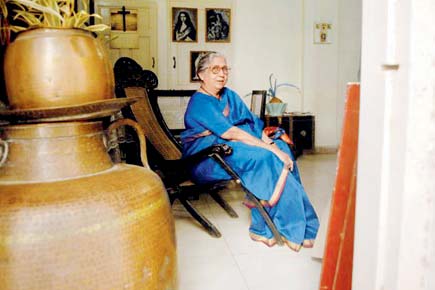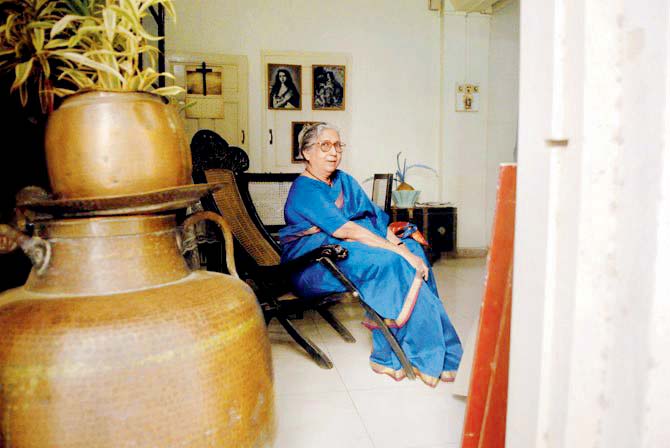The late historian's research and writings about both regions is a treasure that needs to be kept alive for coming generations


Dr Teresa Albuquerque at her Santacruz home. File pic
ADVERTISEMENT
 It was a memorial service unlike any other. As we made our way up the wooden stairs to reach the chapel of St Xavier's College, the bustle and din from beyond had miraculously vanished. It was an unusually muggy day in July. Sunlight was beating down in all its glory through the high windows, showcasing details of the stained glass etchings above the altar, painting the sacred space in decadent hues of yellow. Like a page from a treasured history book, this tiny congregation could well have been part of a sepia-tinted photograph from within its chapters.
It was a memorial service unlike any other. As we made our way up the wooden stairs to reach the chapel of St Xavier's College, the bustle and din from beyond had miraculously vanished. It was an unusually muggy day in July. Sunlight was beating down in all its glory through the high windows, showcasing details of the stained glass etchings above the altar, painting the sacred space in decadent hues of yellow. Like a page from a treasured history book, this tiny congregation could well have been part of a sepia-tinted photograph from within its chapters.
We spotted some of the city's respected historians, retired and serving professors from the college as well as other educational institutions, members of the clergy, and friends and family among the gathering. It was a time to reminisce and celebrate the life and works of late Dr Teresa Albuquerque, who had passed away a few weeks earlier. The intimate service was peppered with sharing of anecdotes - personal and professional - by her peers and former colleagues, and her kin — each revealing fascinating glimpses of how the historian had touched their lives.
Yours truly, invited to speak as a member of Mumbai's press, recalled the first meeting with the genial octogenarian, back in 2011 in her Santa Cruz home. This was immediately after the release of her book, Goan Pioneers in Bombay. Dreamily quaint, and dressed with curios and antiques from her beloved Goa and elsewhere, she gave us the house tour, without any hesitation. The interview had been long forgotten; time stood still, and we were traipsing between Bombay and Goa, hopping from one century to another, chronicling the trials, struggles and triumphs of the Goan living out his new life in the big, exciting city that he now called home. At the end of that long chat, we were able to see the Goan in Mumbai in new light. Add to that her research on the suburb of Santacruz opened another conversation in our time with her.
Back to our vignettes from the service. As her peers spoke movingly about their interactions, and her mammoth body of work, one factor became increasingly evident. Dr Albuquerque chose to remain in the background, and silently went about her research with steely resolve and dedication. No show, and very little noise about her achievements. It probably was our most important take away from the day. Her works, till date, can rarely be found in any of the city's bookstores, let alone e-stores. Thankfully, we had picked up a copy of Santa Cruz That Was, her ode to the suburb she called home during that memorable first visit. We've rarely promoted a book in this column, but if you're a Santa Cruzwallah, keen to know of its origins, get your hands on a copy.
As the service wound up, and we left the chapel, it felt as if we were part of an extended history lesson - how it should be shared in classrooms. We could nearly imagine Dr Teresa Albuquerque smiling from the heavens, pleased that she had an attentive, engaging audience.
Oscar Wilde had once famously said: "Anyone can make history. Only a great man can write it." Dr Albuquerque lived that famous quote, ever so beautifully.
mid-day's Features Editor Fiona Fernandez relishes the city's sights, sounds, smells and stones...wherever the ink and the inclination takes her. She tweets @bombayana. Send your feedback to mailbag@mid-day.com
 Subscribe today by clicking the link and stay updated with the latest news!" Click here!
Subscribe today by clicking the link and stay updated with the latest news!" Click here!






